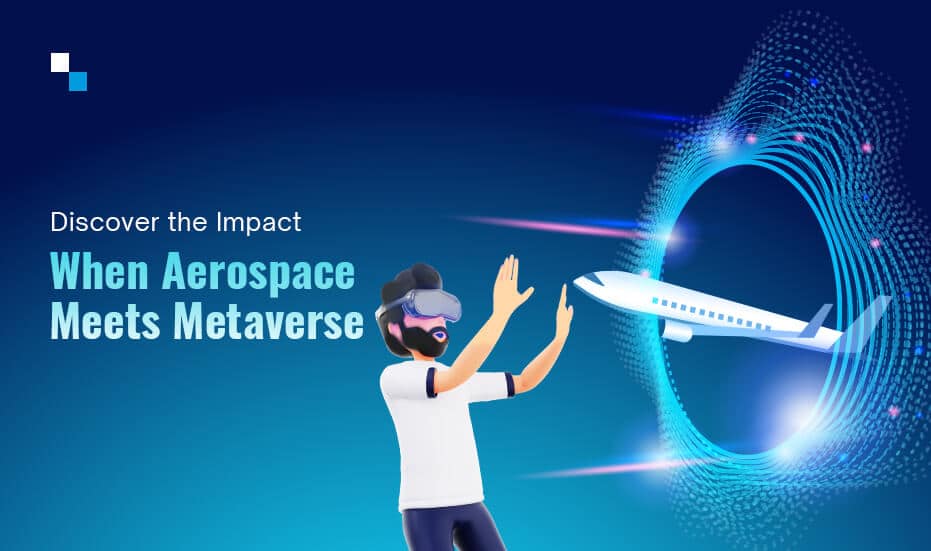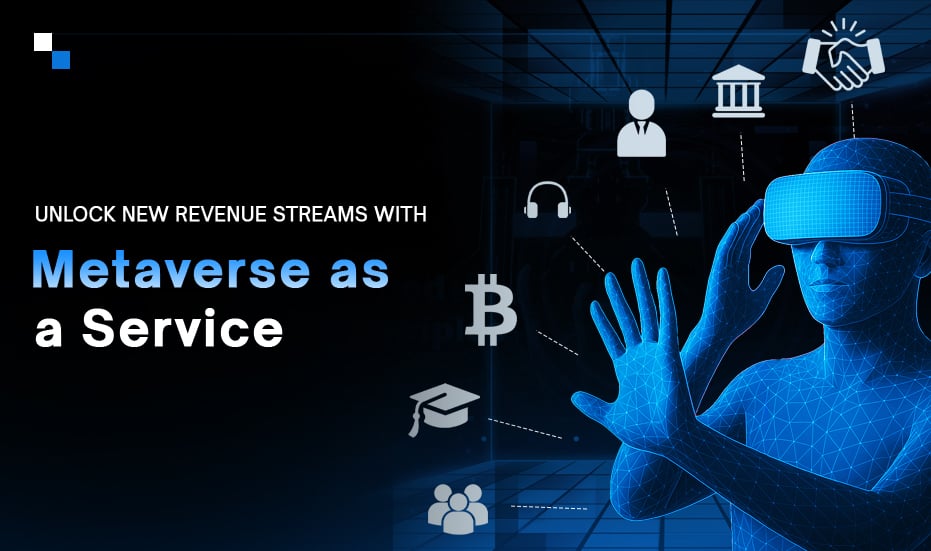
What’s the Importance of Cross-chain Interoperability for DeFi?
June 26, 2023
The Rise of Meme Crypto Coin Development: Exploring the Implications
June 28, 2023Have you ever wondered what it would be like to step into the shoes of an astronaut, floating weightlessly in space? How about experiencing the thrill of piloting a state-of-the-art aircraft without leaving the ground? The Metaverse unlocks endless possibilities for us to venture into these extraordinary realms.
While the concept of the Metaverse may seem like a distant sci-fi dream, many industry verticals are already exploring its potential. One such industry is aerospace, which utilizes the Metaverse to revolutionize its operations. By merging virtual reality, augmented reality, and immersive technologies, Aerospace Industry in Metaverse is pushing the boundaries of innovation, training, and customer experiences.
This article will take you through the journey of transformation of the Aerospace Industry with the incorporation of Metaverse and its impacts. Let’s get started!
Evolution of the Aerospace Industry
The Aerospace industry has come a long way since the first successful flight by the Wright brothers in 1903. From the early days of aviation to the modern era of space exploration, the industry has constantly pushed the boundaries of what is possible. With each new technological advancement, the Aerospace industry has been able to achieve something new that was once thought to be impossible. Today, we stand at the height of yet another revolution – Metaverse in Aerospace.
The metaverse is a virtual reality space where users can interact with a computer-generated environment and other users in real time. It is a fully immersive and interactive experience that blurs the lines between the physical and digital worlds. For the Aerospace industry, the metaverse represents a new frontier for innovation and collaboration. It offers the potential to overcome the limitations of physical space and time, allowing for unprecedented levels of exploration and discovery.

Current Challenges in the Aerospace Industry
Though the Aerospace industry is doing well and growing with time, it still is facing a unique set of challenges that hinder progress and innovation. The following are some of the major challenges-
- Cost and Budget Constraints
Developing and manufacturing aircraft, spacecraft, and related technologies involve significant financial investments. Cost overruns, budget constraints, and the need for cost-effective solutions pose challenges for companies in the aerospace sector.
- Aerospace system complexity
Aircraft and spacecraft are highly intricate machines that require precise engineering and rigorous testing. Any errors or malfunctions can have catastrophic consequences. This complexity also extends to the training and simulation of aerospace personnel. Pilots, astronauts, and ground crew need extensive training to ensure their competence and safety.
- Safety and security concerns
The regulations can sometimes slow down the pace of innovation and make it difficult for new players to enter the market. However, despite these challenges, the aerospace industry has always found ways to overcome them and push the boundaries of what is possible.
- Prototyping and Testing
Developing and testing prototypes in the Aerospace industry can be time-consuming and expensive. Physical prototypes require significant resources and may involve lengthy iteration cycles to achieve desired outcomes.
- Sustainability and Environmental Impact
The Aerospace industry faces increasing pressure to reduce its environmental footprint and adopt more sustainable practices. Developing innovative solutions to minimize fuel consumption, optimize aircraft design for fuel efficiency, and reduce emissions are ongoing challenges.
These limitations of the aerospace industry are somehow becoming a barrier to its growth and development. Not just this, even as the demand for air travel and space exploration increases, it becomes crucial to address these challenges to ensure a thriving industry.

How Metaverse in Aerospace is the Ultimate Solution?
Undoubtedly, the metaverse holds the potential to be a game-changer for the aerospace industry, offering solutions to some of the industry’s most pressing challenges. There is a wide range of opportunities for the Aerospace industry to overcome its current challenges and revolutionize the way it operates, with features like─ virtual reality, augmented reality, and mixed reality technologies. By harnessing these, the Metaverse in defense and aerospace can transform the world of aircraft and spacecraft with next-gen functionalities.

- Manufacture and Design
One of the key areas where the metaverse can make a significant impact is in Aerospace manufacturing and design processes. Traditionally, the design of aircraft and spacecraft involves physical prototypes and extensive testing. This process can be time-consuming, expensive, and limited by the laws of physics. However, with the metaverse, engineers can design and test their creations in a completely digital environment.
By using VR and AR, engineers can visualize and interact with their designs in ways that were previously not possible. They can identify potential flaws and make necessary adjustments before any physical manufacturing takes place. This not only saves time and money but also allows for more innovative and efficient designs.
Therefore, the Metaverse on Aerospace empowers manufacturers and designers with an immersive and collaborative environment, enabling them to push the boundaries of innovation and deliver advanced and optimized products to the market.
- Training and Simulations
Training and simulation are critical components of the Aerospace industry. Pilots and astronauts must undergo rigorous training to ensure their competence and safety. Similarly, ground crew and engineers need to be well-prepared to handle any situation that may arise. The metaverse offers a unique opportunity to enhance training and simulations in the aerospace industry.
With the metaverse, pilots and astronauts can undergo realistic simulations of various scenarios, ranging from takeoff and landing to emergency situations for interactive and hands-on experiences. These simulations can be conducted in a virtual environment that accurately replicates the conditions they will encounter in the real world. This allows for more effective training and better preparation for actual missions.
It won’t be wrong to say that metaverse-based training and simulations offer a cost-effective, scalable, and highly immersive approach to skill development and validation in the Aerospace industry. Metaverse in Aerospace industry empowers professionals to enhance their expertise and improve safety practices in virtual environments that closely replicate real-world scenarios. This enhances their decision-making, situational awareness, and overall proficiency.
- Industry events and Conferences
In the Aerospace industry, conferences and events play a crucial role in knowledge sharing, networking, and collaboration. However, physical conferences can be expensive and time-consuming to organize and attend. Here, Metaverse can be used to facilitate virtual conferences and industry events.
With Metaverse in Aerospace, professionals from around the world can come together in a virtual space to share ideas, present research, and collaborate on projects. This not only reduces the cost and logistical challenges associated with physical conferences but also allows for a more inclusive and accessible experience. It eliminates the barriers of physical distance and time zones, making it easier for professionals to connect and collaborate.
Also, it allows for virtual exhibition halls and booths, where Aerospace companies can showcase their products, technologies, and services. Attendees can explore these virtual spaces, access product demonstrations, and interact with company representatives in real time.
- Space exploration and Satellite technology
Perhaps the most exciting opportunity offered by the metaverse is in the field of space exploration and satellite technology. The metaverse has the potential to revolutionize the way we explore the cosmos and gather data from space. Astronauts can use virtual reality to simulate spacewalks and other extravehicular activities, allowing for more efficient and realistic training.
Furthermore, the metaverse can be used to control and operate satellites in real time. Satellites are crucial for various applications, including weather forecasting, navigation, and communication. With the Metaverse in Aerospace, satellite operators can remotely monitor and control their spacecraft from anywhere in the world, reducing the need for physical presence and enabling faster response times.
In space exploration, the metaverse provides virtual simulations of celestial bodies, allowing scientists and engineers to study and analyze planetary surfaces, asteroids, and other astronomical phenomena. Also, the engineers can model and analyze the performance of satellite constellations, antenna configurations, and data transmission protocols, ensuring optimal functionality and efficiency virtually.
- Education and Outreach
The metaverse in aerospace and defense provides a unique and immersive platform to engage and educate individuals of all ages about aerospace concepts, space exploration, and the wonders of flight. With metaverse, virtual environments can be created to simulate space missions, allowing students to explore spacecraft, planetary surfaces, and astronomical phenomena.
Interested scholars can participate in virtual experiments, interact with virtual models, and gain hands-on experience in a virtual aerospace laboratory. This enhances understanding and retention of complex aerospace concepts. Aerospace organizations can utilize the metaverse for outreach initiatives to inspire and educate the general public about aerospace advancements.
Furthermore, the metaverse provides opportunities for career exploration and skill development in the aerospace industry. Virtual simulations and training programs can introduce individuals to various aerospace roles, such as pilots, engineers, or astronauts. This helps in attracting and nurturing talent for the future of the aerospace industry.
- Digital Twins and Predictive Maintenance
Digital Twins and Predictive Maintenance are key applications of Metaverse technology in the aerospace industry, offering significant benefits in terms of asset performance, maintenance efficiency, and cost savings.
By creating a digital twin in the metaverse, aerospace companies can monitor real-time data from sensors and systems, enabling them to gain insights into asset behavior and performance. This virtual representation allows for the analysis of operational data, identification of potential issues, and prediction of maintenance needs.
Aerospace Industry in Metaverse can apply advanced analytics and machine learning algorithms to analyze historical data and detect patterns or anomalies that indicate potential equipment degradation or failures. This enables timely maintenance interventions, reducing downtime, improving asset availability, and optimizing maintenance schedules.
Future of the Aerospace Industry in Metaverse
Apparently, the metaverse holds immense potential from transforming manufacturing and design processes to enhancing training and simulations. It obviously can revolutionize the way we explore and operate in space. It offers unprecedented opportunities for collaboration, innovation, and exploration that were once only imaginable.
Virtual reality and augmented reality will enable users to virtually step into the world of aerospace, experiencing space exploration, aircraft operations, and even futuristic concepts in a highly realistic and engaging manner. This will not only captivate enthusiasts but also provide valuable insights for professionals in the field. Collaboration and partnerships between Aerospace companies and Metaverse platform providers will be key to unlocking the full potential of the Metaverse in the aerospace industry.
All in all, the integration of metaverse in aerospace and defense seems to be an exciting and promising future that holds tremendous potential for the advancement of aerospace technology and our understanding of the universe.

Conclusion: Antier Leads the Aerospace Revolution
The aerospace industry is on the brink of a new era of exploration and innovation, all thanks to the metaverse. By embracing virtual reality, augmented reality, and mixed reality technologies, the industry is unleashing infinite possibilities for design, training, collaboration, and exploration. The Metaverse in Aerospace is breaking down barriers and opening up a whole new universe to explore.
As the world continues to reach for the stars, the metaverse will be the guide propelling further and faster than ever before. Antier is at the forefront of this revolution, empowering Aerospace companies to navigate this transformative landscape and harness the power of the metaverse with its years of experience and expertise. We are committed to partnering with aerospace companies to create tailored and immersive experiences that drive their success in the metaverse.
What are you waiting for, get ready to take flight into a whole new dimension now!



